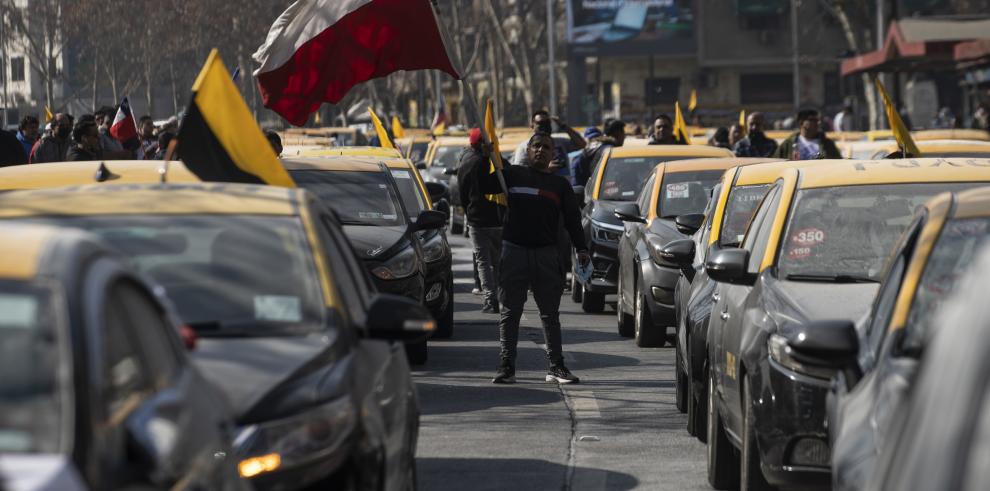Another week, another show of dis-satisfaction. What is the driving force of anger?
- By : James Bryson
- Category : Human Interest, Infrastructure, Political FRAUD

The high cost of fuel in Latin America has led food manufacturers, carriers and other people to demand a fair price from their governments so as not to turn off their engines that drive productivity and seek a solution to the high cost of gasoline. .
On the one hand, Chile is facing protests not only because of the high cost of fuel, but also because of the exaggerated cost of applications which facilitate transportation. More than 200 taxis restricted a main artery of the Chilean capital on Tuesday to protest against the increase in fuel prices and ask the Government for greater regulation of transport platforms. Taxi drivers also protested the price of fuel, which has risen for 48 consecutive weeks in Chile and it is estimated that the rise is around 20% since the beginning of the Russian invasion of Ukraine.
The Government of Chile, a net importer of oil, presented a bill in late March to inject 40 million dollars into a fund that stabilizes fuel prices and that was approved unanimously in Parliament in early May. The Oil Price Stabilization Fund seeks to stabilize domestic fuel prices, thus insulating them from the short-term volatility that affects international prices.
The Minister of Finance, Mario Marcel, said on Tuesday that the fall that the dollar is experiencing after a historic intervention in the Central Bank’s exchange market “has a downward effect” on the price of gasoline imports. “Just as the dollar rose sharply at the time, and that put more pressure on the price of fuel in the local market, now that pressure is going to be less,” said Marcel.
On the other hand, the president of Paraguay, Mario Abdo Benítez, announced this Wednesday that the state oil company Petropar will lower its sales prices for diesel and gasoline, after carriers and truckers began an indefinite strike in protest at the cost of fuel. fuels. Abdo Benítez explained to reporters at the Palacio de López that Petróleos Paraguayos will reduce the price per liter of type III diesel and 93 octane gasoline by about 500 guaraníes. “Today Petropar has the capacity and we are going to transfer that benefit to the final consumer,” explained the official, who argued that the decision is due to the fall in the international price of oil and the average sales of the state company. With the reduction, a liter of diesel will cost 8,300 guaraníes and 93-octane gasoline 8,560 guaraníes,
The state company reported that the discount, which will take effect from this Thursday, covers other fuels and liquefied petroleum gas. For this day, carriers, truck drivers and vehicle drivers affiliated with platforms called for an indefinite strike to demand a drop in fuel, whose fluctuations have generated discontent and fueled protests and roadblocks in recent months. The leader called the Executive’s proposal a “mockery” and clarified that they are looking for a reduction of between 2,000 and 3,000 guaraníes per liter.
In the case of Panama, this is in what would be its fourth week of protests, one of the most interesting issues being nothing more and nothing less than the high cost of fuel. Yesterday, July 26, the President of the Republic, Laurentino Cortizo, joined the dialogue table where he urged all interested sectors to participate in joining the dialogue “as soon as possible” to achieve a solution “in the face of the crisis. ¨.
“Those sectors of society that have expressed their interest in participating in the Single Table of Dialogue for Panama should join that table as soon as possible, so that all Panamanians are represented in this great national effort,” Cortizo declared.
The president held meetings this Tuesday with important unions such as the Chamber of Commerce, the Union of Industrialists of Panama and more in order to reach an agreement before the situation that arises in the country.
Referring to the cost of fuel, Panama has frozen it at $3.25 since last week, although the people want a reduction to $3.00, which is currently causing protests since the government does not see this as a possible solution.
Increased fuel and cost of living due to war between Ukraine and Russia
“The freight crisis, now the increase in fuels that is going to be exacerbated by the war between Ukraine and Russia, are situations that we are going to have to suffer,” said the president of the National Council of Private Enterprise (CONEP).
The economies of Latin America and the Caribbean face a complicated situation in 2022 due to the war between Russia and Ukraine, which opened new sources of uncertainty for the world economy and negatively affected the estimated growth of around 3.3%, less than one point percentage. than expected before the outbreak of hostilities.
At the regional level, weaker growth will be accompanied by higher inflation and a slower recovery in employment. The Economic Commission for Latin America and the Caribbean (ECLAC) said on Monday that the economies of the region face a very difficult situation this year amid external uncertainty, inflation (particularly food and energy) and the slowdown of economic activity.
According to the report presented by ECLAC, “The Latin American and Caribbean consequences of the war in Ukraine: how do we face this new crisis?” The region faces an internal context marked by a strong economic slowdown, high inflation, slow growth and incomplete recovery of the labor market, which will increase the levels of poverty and extreme poverty. As a result, 7.8 million people will be added to the 86.4 million people whose diet is at risk.
Sanctions on Russia
Earlier this week, reports were released showing that this is the first time Russia has defaulted on a debt since 1998 after missing a critical deadline. The Kremlin responded to this accusation, that it had the money to make a payment of $100 million USD but due to sanctions, it was impossible for the money to reach its destination on time.
To date, the United States, the European Union, the United Kingdom, and other countries have sanctioned more than 1,000 Russian individuals and companies.
Due to the sanctions that have already been imposed, the country is expected to suffer a deep recession and contract by 10% in 2022. Currently, supermarkets are full to supply the needs of Russian citizens although this is expected to stop happen and that certain imported items become unavailable according to Steve Rosenberg, editor of BBC Russia.
Similarly, a large number of Western companies have completely or partially closed their businesses in Russia, such as Nike, McDonald’s, Nestlé, Visa, Mastercard, Sony, Netflix and many others.
In addition, the country registered an annual inflation of 17.1% in May and the sale of cars fell 83.5% during the same month.



No Comments